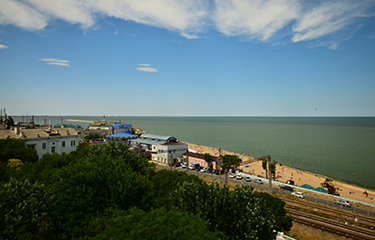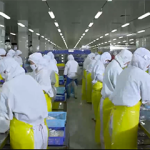After long commercial fishing shutdown, anchovy showing up in abundance in Caspian Sea

Commercial fishing in the Caspian Sea – the largest inland water body on the planet – has resumed and is producing at better-than-expected levels.
Last year brought results exceeding those of 2019 – the first year fishing of certain key species had been allowed in the sea for years. Now, scientific forecasts and recommended harvests for 2021 have increased further still, making the sea a potential growth area for Russia's commercial fishing sector.
Territorial control of the Caspian Sea is divided among Russia, Turkmenistan, Kazakhstan, Azerbaijan, and Iran, but commercial fishing was banned in the sea for 20 years in order to help its stocks recover. Fishing was first permitted again in 2019, and then in 2020 catches ended up being significantly higher than expected.
Last year, Russian fisheries caught 16,900 metric tons (MT) of various species, and the forecast for 2021 is 115,000 MT, the Russian Research Institute of Fisheries and Oceanography (VNIRO) said in a statement. Of that new number, 98,500 MT consists of anchovy, the largest fishery by volume in the Caspian Sea and the most sought-after species.
The total anchovy catch was 14,700 MT in 2020, four times more than in 2019 and 12.2 times more than the yearly average between 2011 and 2018. Utilization of the recommended catch for anchovy was just 14.8 percent, meaning the possible catch can be at least six times higher.
“The last time such volume was seen was 15 years ago,” VNIRO said.
The catch of herring was more than 1,000 MT, twice as much as the year’s average catch in 2011-2018. Mullet was also more than 1,000 MT, another very positive result. For the first time in decades, fishing of tubenose gobies was resumed, and brought 200 MT.
VNIRO forecasts that fish stocks will continue to increase.
Companies have reacted to the news by relocating resources to the Caspian Sea. Kalinigrad, Russia-based Za Rodinu and Marfish sent five vessels to the port of Makhachkala from the Baltic Sea for the 2021 season. Za Rodinu Director Sergei Lutarevich said that company's two vessels will catch up to 7,000 MT of anchovy, the New Kalinigrad news agency reported.
The entirety of the catch will be delivered to local processing plants and facilities in the Kaliningrad region. Za Rodinu hopes to build a processing plant of its own there with an annual capacity of 5,000 MT of anchovy, costing RUR 100 million (USD 1.32 million, EUR 1.1 million), Lutarevich said.
At the moment, the Caspian Sea's anchovy stock is estimated to be between 450,000 and 500,000 MT.
The main obstacle to access the resource in the Caspian Sea is the amount of fleet available for fishing, with just 15 vessels harvesting anchovy in 2020. In the Soviet era, around 100 ships would be fishing in the sea, 65 of them being medium-sized. However, Kaspryba Fisheries Association President Andrei Markin told the Kaspiyskiy Vestnik newspaper he expects a ramp-up in commercial activity once fishing companies see it as a profitable endeavor.
Photo courtesy of Sergey/Shutterstock






Share